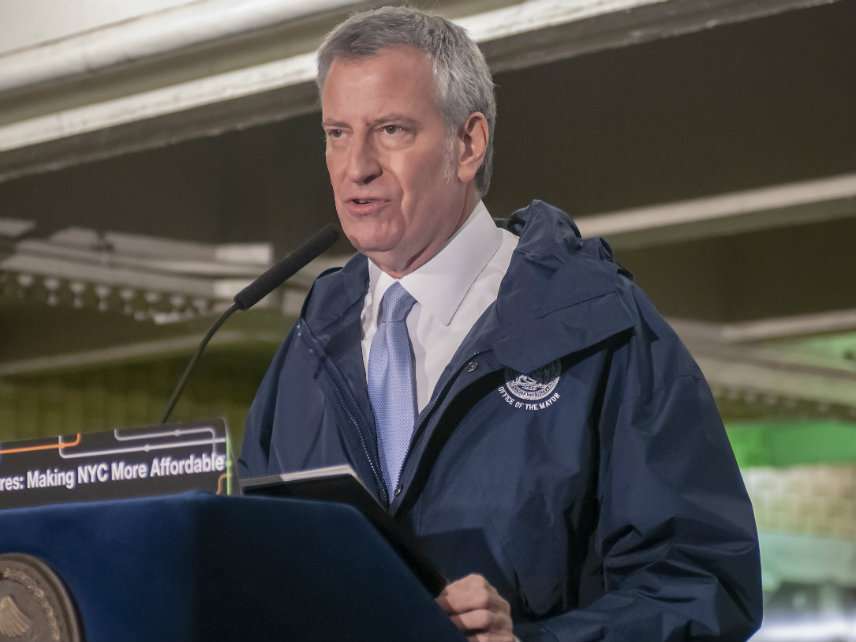Bill de Blasio: 'We Will Seize Their Buildings, and We Will Put Them in the Hands of a Community Nonprofit'
NYC's mayor takes on private property (again).

Fresh off proposing yesterday that private employers be required to provide their workers with 10 days of paid vacation, New York City Mayor Bill de Blasio set his sights on a new target: property owners.
During his State of the City Address, delivered Thursday, de Blasio warned that the city will take action against landlord abuse, even if that means seizing private property.
"When a landlord tries to push out a tenant by making their home unlivable, a team of inspectors and law enforcement agents will be on the ground in time to stop it," the mayor said. If fines and penalties don't do the trick, then "we will seize their buildings, and we will put them in the hands of a community nonprofit that will treat tenants with the respect they deserve," he added.
But surely city officials won't have the time to find and punish each one of the city's bad landlords, right? Wrong. That's because de Blasio is creating a new agency devoted solely to landlord abuse: the Mayor's Office to Protect Tenants.
"The city's worst landlords will have a new sheriff to fear," de Blasio said, calling the new agency (which he created on the spot by signing an executive order) a "new arm of city government that will root out the worst landlord abuse."
As the New York Daily News notes, the city already has an Office of Tenant Advocate. However, it has not yet been funded, according to the Progressive Caucus of the New York City Council.
So what will the Office to Protect Tenants do? De Blasio didn't really explain, though his executive order says it will serve as a "central resource for tenants, social service agencies, advocacy organizations, legal services providers, landlords and management companies of affordable housing, and others on tenant issues," including "tenant harassment."
According to his office's website, De Blasio is "pursuing new local law to seize upwards of 40 of the most distressed multiple dwelling buildings annually and transition them to responsible, mission driven ownership." Passage of this legislation would presumably give the Office to Protect Tenants the authority to seize land.
This is really nothing new for de Blasio, who basically told New York magazine in 2016 that he does not believe in the right to private property. "I think people all over this city, of every background, would like to have the city government be able to determine which building goes where, how high it will be, who gets to live in it, what the rent will be," he said. "Look, if I had my druthers, the city government would determine every single plot of land, how development would proceed. And there would be very stringent requirements around income levels and rents."
There are a host of problems with this mindset, as Reason's Scott Shackford detailed at the time. But it all boils down to this: Politicians like de Blasio want to control what other people do with and on their own property. If landowners don't listen, then there's a simple solution: Seize their land.
This sort of thinking doesn't work out in real life. Look no further than an existing New York City program meant to provide affordable housing. The Third Party Transfer (TPT) Program supposedly lets nonprofit groups buy "distressed vacant and occupied multi-family properties," then rent them out to people in need of a relatively cheap place to live. But longtime property owners have complained that the city has seized their homes over unpaid city debts.
Consider retired nurse Marlene Saunders, for instance. She nearly lost her house, a completely paid-off brownstone worth upward of $2.2 million, over an unpaid water bill of less than $4,000. It was only after her local councilman stepped in that the city decided to let Saunders keep it.
The mayor's announcement today doesn't mean that program is going away. In fact, the mayor will actually look to expand the TPT program to meet its goal of seizing more land, according to Crain's New York.
It's worth noting that the worst landlord in New York isn't even a private landowner. In December, then-NYC Public Advocate Letitia James, who's since been sworn in as attorney general of New York State, put the city's own housing authority at the top of her "2018 NYC Landlord Watchlist."
De Blasio may have been alluding to this today when he said the Office to Protect Tenants "will hold every city agency…accountable for protecting tenants." Still, it's ironic that the mayor wants to seize private property when the real problems are happening in city-run buildings.


Show Comments (106)